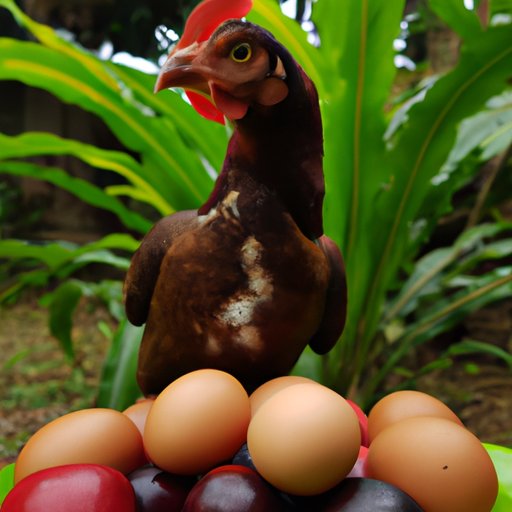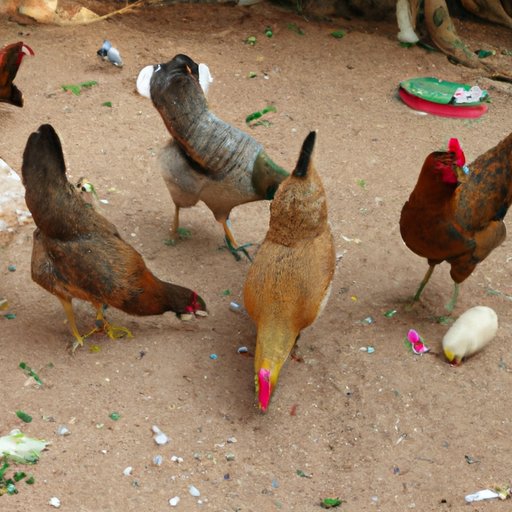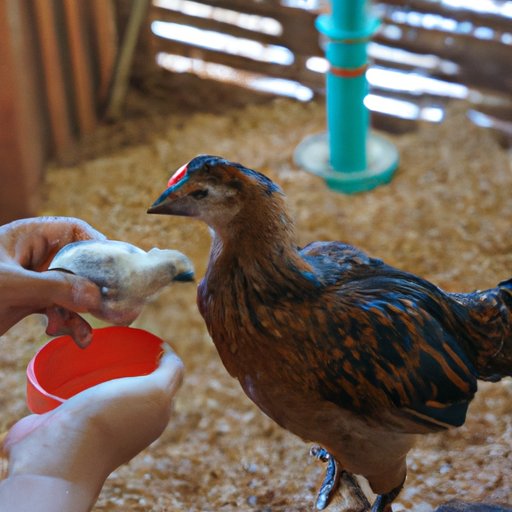Introduction
Chickens are omnivores, which means they can eat both plant-based and animal-based foods. While many people think of chicken feed as mainly consisting of grains and other seeds, these birds actually enjoy and benefit from eating fruit just as much as humans do. In addition to providing chickens with essential vitamins and minerals, fruit also adds variety to their diet and offers them a tasty treat.
Benefits of Feeding Fruit to Chickens
Fruits provide chickens with important nutrients that help keep them healthy. According to Dr. Christine Navarre, a poultry specialist at the University of Florida, “Fruits contain energy, carbohydrates, fiber, vitamins, minerals, and antioxidants. These nutrients are important for overall health and maintaining the bird’s immune system.”
Feeding fruit to chickens is also beneficial because it helps to stimulate their natural foraging behavior. Chickens love to scratch around in the dirt looking for snacks, so adding fruit to their diet gives them an opportunity to act on this instinct. This can help to keep chickens active and entertained, which is important for their mental wellbeing.

How to Choose the Best Fruits for Your Chickens
When choosing fruit for your chickens, it’s important to look for fresh, ripe produce. Avoid any fruits that are moldy, bruised, or showing signs of decay. It’s also best to choose organic produce when possible to avoid exposing your chickens to potentially harmful pesticides and herbicides.
The Top 10 Fruits That Chickens Love
Here are some of the most popular fruits that chickens love to eat:
Apples
Apples are a favorite among chickens. They are sweet, crunchy, and full of vitamins and minerals like vitamin C, potassium, and fiber. Apples can be fed to chickens whole, but it’s best to remove the core and any seeds first.
Bananas
Bananas are another favorite of chickens. They are packed with vitamins and minerals like potassium, magnesium, and vitamin B6. Bananas should be chopped into smaller pieces before feeding them to chickens. The skin can be left on if desired.
Grapes
Grapes are a great source of vitamins and minerals, including vitamin K, vitamin C, and manganese. Grapes should be washed thoroughly before feeding them to chickens, and they should be cut into small pieces to make them easier to eat.
Berries
Berries are a nutritious and delicious snack for chickens. Strawberries, blueberries, raspberries, and blackberries are all safe to feed to chickens. These fruits are rich in vitamin C and antioxidants, which can help to boost the immune system. Berries should be washed before feeding them to chickens.
Citrus Fruits
Citrus fruits like oranges, lemons, limes, and grapefruits are a great source of vitamin C and can help to boost chickens’ immune systems. Citrus fruits should be peeled before feeding them to chickens, and the seeds should be removed to prevent choking.
Watermelon
Watermelon is a refreshing summer treat for chickens. It is high in vitamins A, C, and B6, as well as potassium and dietary fiber. Watermelon should be cut into chunks before feeding it to chickens.
Peaches
Peaches are a sweet and juicy snack that chickens love. They are packed with vitamins A and C, as well as dietary fiber. Peaches should be washed and pitted before feeding them to chickens.
Pears
Pears are a delicious and nutritious snack for chickens. They are high in fiber, vitamin C, and potassium. Pears should be washed and pitted before feeding them to chickens.
Melons
Melons are a sweet and juicy treat for chickens. They are high in vitamins A and C, as well as potassium. Melons should be cut into cubes before feeding them to chickens.
Plums
Plums are a delicious and nutritious snack for chickens. They are high in vitamin C and dietary fiber. Plums should be washed and pitted before feeding them to chickens.

A Guide to Feeding Chickens Fruits Safely
Feeding chickens fruit can be a fun and rewarding experience, but it’s important to do it safely. Here are some tips for feeding fruit to chickens:
Choosing Fruits
Always choose fresh, ripe, and organic fruits when possible. Avoid giving chickens any fruits that are moldy, bruised, or showing signs of decay. Also, avoid giving chickens any fruits that have been treated with pesticides or herbicides.
Preparing Fruits
Fruits should be washed thoroughly before feeding them to chickens. The skin should be removed from citrus fruits and any seeds should be removed to prevent choking. Fruits should also be cut into small pieces to make them easier for chickens to eat.
Serving Fruits
Fruits should be served as a supplement to a balanced diet, not as a substitute for it. Fruits should only be given to chickens in moderation, as too much fruit can lead to digestive issues. Fruits should be served in a shallow dish or scattered on the ground to encourage natural foraging behavior.

Common Misconceptions About Feeding Fruits to Chickens
Many people believe that feeding chickens fruit will make them fat, but this is not true. As long as chickens are given fruit in moderation, there is no need to worry about them becoming overweight. In fact, providing chickens with a variety of fruits can help to ensure that they get the nutrients they need to stay healthy.
Another common misconception is that chickens cannot digest fruit. This is also untrue. Chickens have a gizzard, which is an organ that helps them to break down food, including fruits. As long as the fruit is cut into small pieces and served in moderation, chickens should have no problem digesting it.
Nutritional Benefits of Feeding Fruits to Chickens
Fruits are an excellent source of essential vitamins and minerals for chickens. Fruits are also high in dietary fiber, which helps to keep chickens’ digestive systems running smoothly. Here are some of the key nutritional benefits of feeding fruit to chickens:
Protein
Fruits are a good source of protein for chickens. Apples, for example, contain 2 grams of protein per cup. Protein is essential for maintaining muscle mass and keeping chickens healthy.
Vitamins & Minerals
Fruits are packed with essential vitamins and minerals, such as vitamin C, vitamin K, potassium, and manganese. These vitamins and minerals are important for maintaining overall health and boosting the immune system.
Conclusion
Fruit can be a nutritious and delicious treat for chickens. Not only do they enjoy the taste, but they also benefit from the essential vitamins and minerals that fruit provides. When feeding fruit to chickens, it’s important to choose fresh, ripe, and organic produce and serve it in moderation. With proper care and attention, you can ensure that your chickens get the nutrition they need to stay healthy and happy.
(Note: Is this article not meeting your expectations? Do you have knowledge or insights to share? Unlock new opportunities and expand your reach by joining our authors team. Click Registration to join us and share your expertise with our readers.)
